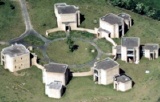PhD summer school: Complex networks: dynamics and control
Mathematics Institute, University of Warwick,
July 3 - 5 2019
Jointly organised by the Mathematics for Real World Systems (MathSys) Centre for Doctoral Training (University of Warwick) and Data Science and Systems Complexity COFUND programme (University of Groningen)
Summary
This 3-day school will provide a postgraduate level introduction to network science, dynamical processes on networks and applications of control theory to networked systems.
Lecturers:
- Prof. Claudio De Persis, University of Groningen
- Dr. Konstantinos Efstathiou, University of Groningen
- Dr. Weisi Guo, University of Warwick and Alan Turing Institute
-
Dr. Sam Johnson, University of Birmingham
- Prof. Francisco A. Rodrigues, University of São Paolo
Registration:
Please register here (you need to scroll down a bit to select this event)
Draft programme
All lectures are in Room D1.07 in the Zeeman (Mathematics) building - follow signs for the Centre for Complexity Science.
Lunches, breaks etc are in the Complexity Science common room adjacent to D1.07.
Wednesday July 03
Thursday July 04
Friday July 05
Summary of topics
Claudio De Persis
Designing controllers for unknown systems using data
Konstantinos Efstathiou
Dynamics and synchronization of globally coupled oscillators
Weisi Guo
Resilience and Data Science for Networked Complex Systems
Sam Johnson
Lecture 1: Neural networks
The brain is often called ‘the most complex system in the known universe’. Despite the puzzling recursivity of that description, the organ with which we appear to think, feel, remember and decide what to do is certainly a paradigm of complexity. It provides an ideal case study into how networks have been used, in combination with various dynamical system models, to tackle some of the most challenging problems we face. Our current understanding of cognition and our most powerful artificial intelligence are both underpinned by neural networks. I will describe some of the research that has led us to where we are now, and consider the main difficulties in progressing further.
Lecture 2: Directed networks
In many, if not most, complex systems the interactions between elements are not necessarily symmetric, so they are best described by directed networks (in which edges can be represented with arrows rather than lines). But when it comes to studying such networks mathematically, it is usually assumed that they are essentially like undirected networks, with directionality being just another property which might be thought of as a random binary number associated with each edge. In fact, the directions of edges in a network can exhibit a degree of global order somewhat analogous to ferromagnetism in spin systems. In some networks edge directions are indeed statistically independent of each other; but in others they can be aligned to a greater of lesser degree with a global direction, and this can be crucial for many topological and dynamical properties. I will describe recent research into aspects of directed networks – such as trophic coherence, non-normality and the prevalence of feedback loops – and its relevance for the study of complex systems.
Francisco A. Rodrigues
Introduction to Complex Networks: structure and dynamics
See also:
Mathematics Research Centre
Mathematical Interdisciplinary Research at Warwick (MIR@W)
Past Events
Past Symposia
Where possible, visitors should obtain an EDUROAM account from their own university to enable internet access whilst at Warwick.
You can register for any of the symposia or workshops online. To see which registrations are currently open and to submit a registration, please click hereLink opens in a new window.
Mathematics Research Centre
Zeeman Building
University of Warwick
Coventry CV4 7AL - UK
E-mail:
MRC@warwick.ac.uk

